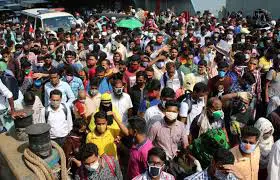**Author: Prof. Engr. Zamir Ahmed Awan, Sinologist (ex-Diplomat), Editor, Analyst, Non-Resident Fellow of CCG (Center for China and Globalization), National University of Sciences and Technology (NUST), Islamabad, Pakistan. (E-mail: [email protected]).
Unrest, protests, agitations are continued in Bangladesh, and gas lost precious human lives. The demonstrations sparked due to Prime Minister Narendra Modi's state visit to mark 50 years of Bangladesh establishments.
The history of disputes between Bangladesh and India goes back to as early as the 1940s. When the British divided Bengal into East and West Bengal. Which was not accepted from the core of the heart of Bangalis on either side. The Occupation of India on the part of Bengal was a cause of tension between the two countries. Border disputes, trade imbalance, and Indian hegemony were witnessed as significant reasons for tensions in bilateral relations. Bangladeshis never tolerate Indian involvement in domestic affairs and coercion. Rivers and Water sharing were also a matter of deep concern for Bangladeshis. The Visa regime was not fair, and Bangladeshis were victimized often.
The most immediate concern was the Ammended discriminatory Bill passed by the Government of Narendra Modi, which aims to cancel the nationality of millions of Bangladeshis, who migrated to India in the 1970s due to political turmoils and economic situations in Bangladesh. According to the amended bill, India wanted to deport millions of Bangladeshis and send them back to Bangladesh. At the same time, Bangladesh is a highly populated country and not willing to accept millions of more people. The migrated Bangladeshis, who have already lived in India for almost five decades, are fully integrated in India and have established their businesses and properties. Most of them are settled in the Indian State of Assam and Bihar, which were part of united Bangal, sharing the same language and culture, so they are well integrated with the locals conveniently. Canceling their nationality after five decades is a matter of Human Rights and unjust.
Narendra Modi's extremist and discriminatory policies are facing condemnation worldwide, but Bangladeshis are more concerned with Muslims' treatment by RSS and BJP. The Indian atrocities and brutalities in Kashmir, Assam, Bihar, and other parts of the country are not welcomed.
India knew the public sentiments in Bangladesh and had to cancel its visit last year due to threats of protests and agitation to oppose PM Narendra Modi's visit. This year, the dangers of protests and agitations to stop the visit was also known. However, PM Modi, ignoring the public sentiments, has traveled to Bangladesh, which caused unrest, which led to the loss of precious human lives. Although 12 deaths were announced officially, but the local resources are reporting rather high causalities.
PM Modi has close relations with PM Shaikh Hasian Wajid and his father, Shaikh Mujeeb Ur Rehman. He has confessed that he was involved in an insurgency against Pakistan to separate Bangladesh at his young age of 20-22. However, the masses in Bangladesh are not Pro-Indian, and especially opposing Modi's discriminatory policies toward Minorities.
As a matter of fact, India is in odd relations with all its neighbors, including Bangladesh, China, Nepal, Myanmar, Pakistan, Maldives, Sri Lanka, etc. There was immense pressure on PM Modi from American President Joe Biden to improve its Human Rights record and relations with neighbors. This visit was part of that pressure, but it turned counterproductive. It seems the bilateral ties between India and Bangladesh might worsen.
It is worth mentioning that all India's neighbors are enjoying good relations with China and are beneficiaries of the Chinese mega Initiative Belt and Road (BRI). China is a ray of hope for all of them for socio-economic developments and counters India's hegemony in the region. Pro-China is also a matter of deep concern for India.
(ASIA PACIFIC DAILY)
 简体中文
简体中文




